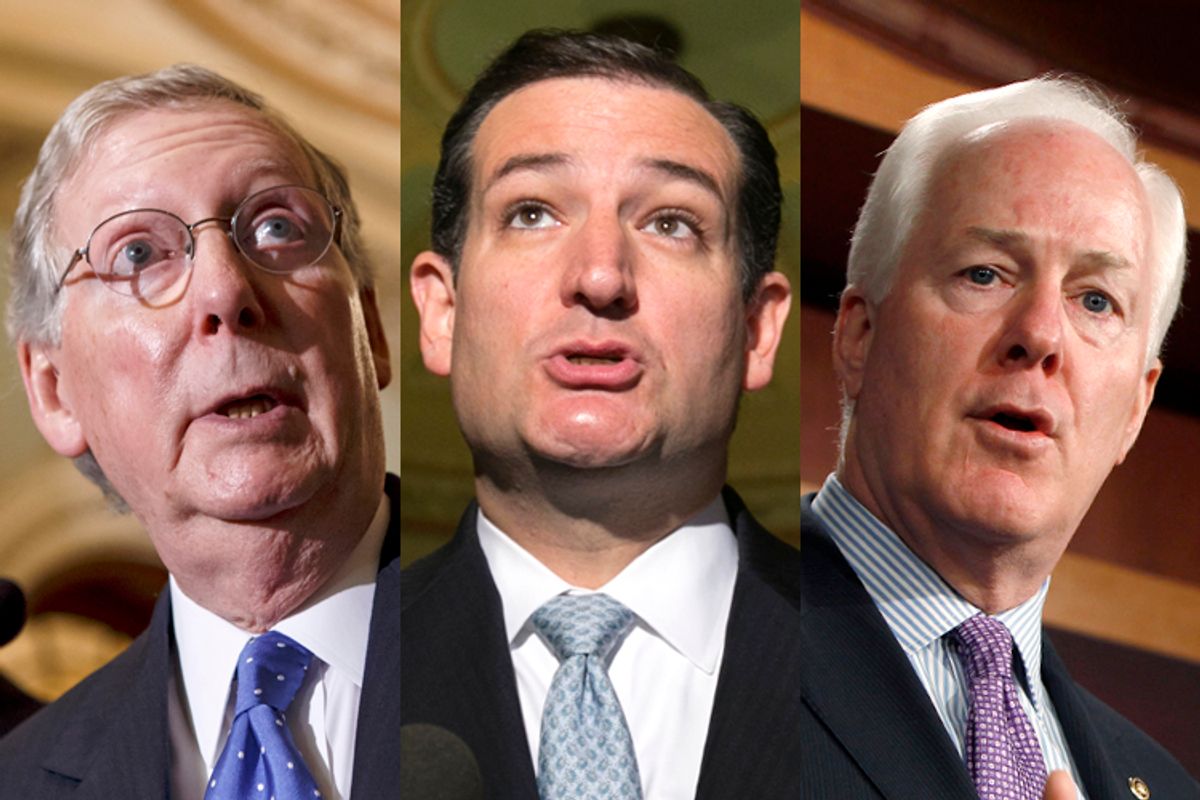Nobody expected Senate Republicans would kill a House-passed bill to unconditionally extend the debt limit through 2014 and, as predicted, it overcame a filibuster Wednesday evening with weeks to spare before the deadline.
But for a brief moment, Senate Republicans were overcome by a collective action problem. As a group, they surely didn't want to vote the debt limit increase down and own the ensuing market panic. But as individuals, none of them wanted their names associated with its passage.
[embedtweet id=433679359715864576]
For what seemed like an eternity (but was actually only about 30 minutes) the bill wobbled in limbo on the Senate floor with 58 votes -- 55 from Dems, three from Republicans -- two shy of the 60 required to break a filibuster and no GOP volunteers forthcoming.
It was at this point that Republican operatives across Washington began cursing Sen. Ted Cruz, R-Texas, for having made a big show of erecting the 60-vote hurdle in the first place. Without a filibuster, Democrats could've carried it by themselves. With a filibuster, at least five Republicans had to walk the plank. And they weren't going to do that without cover from GOP leaders, the two highest ranking of which are both in cycle this year.
After a lengthy huddle, both of those leaders -- Mitch McConnell, R-Ky., and John Cornyn, R-Texas -- cast their votes to break the filibuster almost simultaneously.
Once the threshold had been cleared, seven more Republicans joined them. Each of these team players was seemingly willing to provide cover for their colleagues, but not if the leaders intended to leave them stranded after having aggressed the fight in the first place.
After telling reporters the bill would likely fail, Sen John Thune, R-S.D., a party leader himself, helped assure its passage. In the end it wasn't even that close.
When it was all over, the non-Cruz wing of the party expressed its gratitude to McConnell (whose race is much more competitive than Cornyn's) for acting with courage and integrity. What they couldn't say, but they knew full well, is that McConnell and Cornyn invited all of this upon themselves.
For three years now, McConnell has characterized every debt limit increase as a favor President Obama has requested of Congress -- a normatively bad thing Republicans simply would not agree to without some kind of equally partisan quid pro quo. And every time he's revealed he was bluffing. In 2011, twice in 2013, and again on Wednesday. It even worked the first time!
But by treating what he knows to be a must-pass measure as a recurring source of leverage for Republicans, he helped foster an expectation among conservative voters that the debt limit wouldn't be increased without concessions from Democrats. That Republicans would never honor an Obama "request" like this without pocketing something significant in return.
Obama's recognition of both the bluff and the tell came too late to escape the still-rolling catastrophe of the 2011 debt limit deal, but has since left McConnell and other GOP leaders without a plausible explanation for their mounting defeats. By McConnell's own standard he's done Obama's bidding multiple times now, most recently without pocketing even a pretense of a concession. And as such, it's hard to take his frustration -- and the rest of the Republican establishment's frustration -- with conservative pressure groups gunning for his Senate seat seriously.
Cruz wouldn't even entertain a question about whether McConnell should keep his leadership role next Congress -- not because he has no opinion on the matter necessarily, but because he won't even grant the assumption that McConnell will win his reelection in the first place.
“That is ultimately a decision, in the first instance, for the voters of Kentucky to make,” he said.
Once the danger had passed, several of the Republicans who'd helped the debt limit bill clear the filibuster issued press releases boasting of their votes against final passage. This is a disingenuous distinction for them to draw, and it won't fly with conservative voters. If helping to break a filibuster was forgivable pro forma, Senate Democrats would've passed a lot of bills that'll probably never pass and Harry Reid wouldn't have had to invoke the nuclear option to confirm Obama's judicial and executive branch nominees.
But they can't bring themselves to admit that the play that paid off so big in 2011 won't work ever again. And so the best they can do is to pretend that accepting defeat after a huge bluff is some kind of profile in courage.

Shares